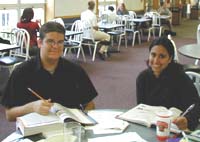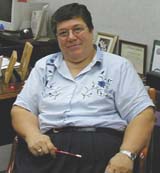|
The Freshman Fifteen: Battling the Bulge

|
Sophomores Chris Yfangis and Manisha Kumar at dinner in the
South Campus Dining Hall. (Photo by Taashi Rowe / Maryland
Newsline)
|
By Taashi
Rowe
Maryland Newsline
Tuesday, Oct. 29, 2002
The 12 pounds that sophomore financing major Manisha Kumar gained in her first year at the University of Maryland were enough to
cause her to re-evaluate her eating habits.
Kumar stopped her constant
snacking on fast foods and stopped eating meat, becoming a vegetarian. She
shifted from infrequent exercise to working out in the gym two to
three times a week.
The changes brought positive results: Kumar says she has dropped
about four pounds in the past month alone.

|
Nutritionist Jane Jakubczak (Photo by Taashi Rowe / Maryland
Newsline)
|
Jane Jakubczak, a
nutritionist at the University Health Center, says Kumar's freshman weight gain
isn't unusual. She says freshmen often gain pounds as they adjust to choosing all their
own foods and eating on the run.
Many of the food
choices freshmen make are high in calories and can lead to weight gain, she
says.
In the campus dining halls, where most of the 3,550 freshmen
living on the College Park campus choose their meals, tacos, fried chicken,
hamburgers and fries, pizzas, cookies, brownies and ice cream are offered
alongside the healthier fresh vegetables, fruits, rice, milk and
juices.
Jakubczak says a bad choice can be made worse if it's coupled
with eating
to deal with stress, rather than hunger, or eating late at
night, or drinking alcohol, which is heavy in calories.

|
Sister Maureen Shrimpe (Photo by Taashi Rowe / Maryland
Newsline)
|
Sister
Maureen Shrimpe, quality coordinator for on-campus dining services, says
dining services puts together a Square Meal and a low-calorie menu
each month to help students choose wisely. The Square Meal
suggests foods from the.U.S Department of Agriculture's
food pyramid guide; the low-calorie menu lists choices
totaling 1,300 to 1,500 calories a day, Shrimpe says.
But students often ignore these plans, she says, and instead fill up on fast food.
Jakubczak agrees. "I had one student who ate
at Wendy's three times a day," she says.
Processed meats, meats high in fat, or poultry with skin all add up
to diets high in fat and cholesterol, according to the U.S. Department
of Health and Human Services. Cheese, whole milk, cream, butter and
regular ice cream are also high in fat and cholesterol. HHS suggests
substituting healthier foods,
such as lean poultry, fish, shellfish, beans, nuts, dry beans, egg whites and egg substitutes, and fat-free or low fat
milk, yogurt and cheese.
Rather than gorge on fast food, a healthier
option for students not on the meal plan would be frozen dinners, like
Lean Cuisine or Healthy Choice, Jakubczak says. "The only problem is that there [are] often not enough vegetables, but it is healthier than McDonald's,"
she says.
Jakubczak says students need to think about how
much they eat in a day and how often, and avoid substituting two Big Macs for a
turkey sandwich just because it may be cheaper.
And, she says,
students should realize that not all weight gain is unhealthy. Most freshmen
are changing from adolescent bodies into adult ones, and weight gain can be
a natural part of the maturation process.
However, she says, students
should recognize that too much weight can lead to high blood pressure,
diabetes and high cholesterol, which can lead to heart disease and joint
pain even in young adults.
Exercise can help--even if it is just
playing a game of basketball or walking. It's a better way to lose weight than crash dieting, Jakubzcak says.
"Diets tend to be a quick fix.
[But] quicker weight loss leads to quicker weight gain," Jakubzcak says. "A
better plan is a moderate diet and changing eating habits," she says.
Kumar says part of the reason her eating habits were so bad was because at first she was only worried about doing well in
school. She says she made more time to study than to eat right or to
exercise.
But, she says, she now realizes that to do well in school, she needs to take care of her health. "There needs to be a balance," she
says.
For students finding themselves slipping into bad eating habits, Jakubczak provides one-on-one nutrition and weight management
counseling at the Health Center. Of the 20 students she sees a week, at
least 50 percent come in to lose weight, she says. Many also come in to work on eating
disorders.
A session with Jakubczak lasts about 45 minutes and can be scheduled by calling (301) 314-8128. Each session
costs $10.
Jakubczak says she also teaches a free weight management class
every Wednesday at noon in the Center for Health and Wellbeing in the
campus Recreation Center.
Copyright ©
2002 University of Maryland College of
Journalism
Top of Page | Home Page
|




